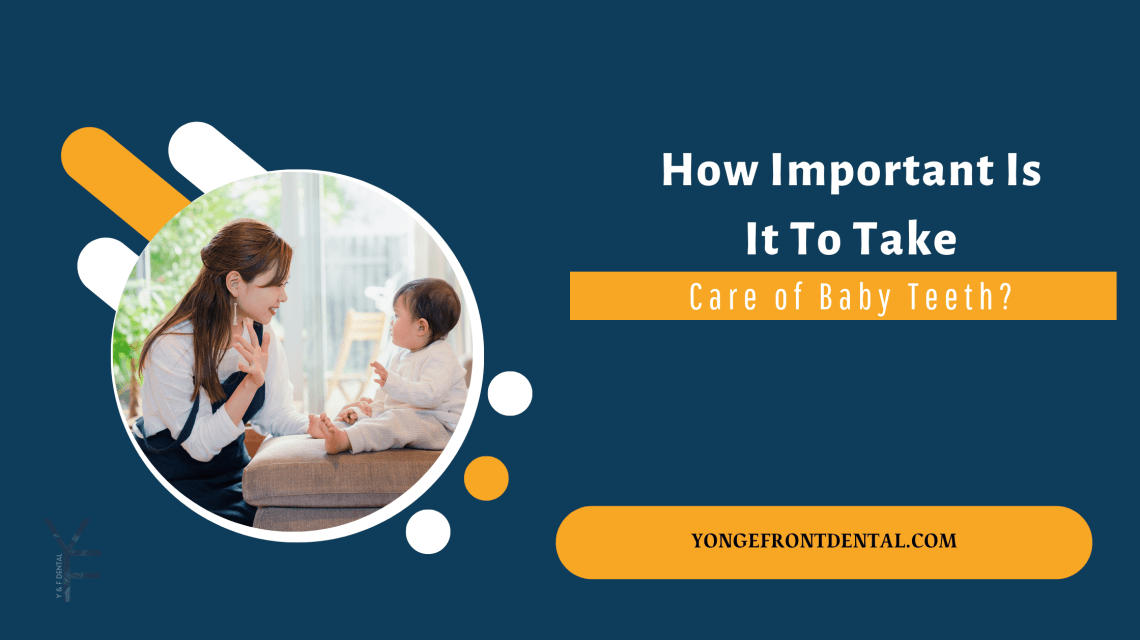When it comes to children’s dental care, one of the most common misconceptions among parents is that baby teeth aren’t that important. after all, they fall out eventually. But the truth is, caring for those tiny teeth plays a critical role in your child’s overall development, comfort, and long-term oral health.
At Yonge and Front Dental in Toronto, we often see the long-term impact that early dental neglect can have. Baby teeth, also called primary teeth, serve many more purposes than simply holding a spot for adult teeth. They support speech development, nutrition, and self-confidence during a child’s formative years. In this article, we’ll explore why these little teeth deserve a lot of attention and how parents can help maintain their child’s healthy smile from day one.
What Are Baby Teeth and When Do They Come In?
Baby teeth usually begin to appear between 6 to 12 months of age and by the time a child turns 3, most will have a full set of 20 primary teeth. These teeth help children chew food properly, develop clear speech, and maintain facial structure.
Here’s a general timeline for baby teeth eruption:
- 6–10 months:Lower and upper central incisors
- 9–13 months:Lateral incisors
- 13–19 months:First molars
- 16–23 months:Canines (cuspids)
- 23–33 months:Second molars
Every child is different, and while this is an average, some variations are perfectly normal.
Why Baby Teeth Matter More Than You Think
They Guide Permanent Teeth Into Position
One of the most important roles baby teeth play is acting as placeholders for permanent teeth. When a baby tooth is lost too early—due to decay or injury—it can cause the remaining teeth to shift, leading to crowding or misalignment when adult teeth emerge. This could increase the need for future orthodontic treatment.
They Support Speech and Chewing
Children learn to speak clearly as their teeth grow in. Missing or decayed teeth can interfere with proper pronunciation. Additionally, chewing becomes difficult if teeth are painful or missing, affecting your child’s ability to enjoy a balanced diet, which can impact growth and development.
They Protect Against Future Dental Problems
Neglecting primary teeth can lead to infections, abscesses, and cavities that cause pain and anxiety. Worse, untreated cavities in baby teeth can affect the development of adult teeth beneath them. Early dental issues can set the stage for long-term dental anxiety and complications.

Common Dental Issues in Young Children
Even toddlers can experience dental problems. Here are some of the most common conditions seen in pediatric dentistry:
- Early Childhood Caries (ECC):Often called baby bottle tooth decay, ECC is caused by frequent exposure to sugary drinks like juice or milk in bottles, especially at bedtime.
- Gum Disease:Yes, even young children can develop inflamed or bleeding gums if oral hygiene is poor.
- Thumb-Sucking and Pacifier Use:Prolonged habits can lead to misaligned teeth or bite problems.
- Tooth Injuries:Kids are active, and falls are common. Injuries to baby teeth need quick attention to avoid long-term complications.
Best Practices for Caring for Baby Teeth
Helping your child develop good oral hygiene habits early on makes dental care second nature later in life. Here’s how to care for baby teeth at each stage:
Infants (0–12 months)
- Wipe your baby’s gums with a soft, damp cloth after feeding.
- Never put a baby to bed with a bottle of milk or juice.
Toddlers (1–3 years)
- Start brushing as soon as the first tooth appears using a soft-bristled toothbrush and a smear of fluoride toothpaste.
- Brush twice a day—morning and night—and make brushing a routine.
- Avoid sugary snacks and limit juice to mealtimes.
- Begin flossing when teeth start to touch.
Preschoolers (3–5 years)
- Use a pea-sized amount of fluoride toothpaste.
- Encourage your child to brush on their own but supervise to ensure it’s done correctly.
- Schedule a dental visit every six months.
First Dental Visit – When and Why?
The Canadian Dental Association recommends that a child’s first dental visit should happen within six months of the first tooth appearing or by their first birthday. This visit helps:
- Check for early signs of tooth decay or developmental concerns.
- Introduce your child to the dental environment in a calm, positive way.
- Educate parents on brushing techniques, nutrition, and habits like thumb-sucking.
It’s much easier to prevent issues than to treat them later.

The Parent’s Role in Building Healthy Habits
Good dental health begins at home. Here’s how parents can make a real difference:
- Be consistent.Make brushing and flossing a part of the daily routine.
- Use positive reinforcement.A sticker chart or small reward can make brushing fun.
- Model good behavior.Kids mimic what they see, so let them see you brushing and flossing.
- Make dental visits routine.Normalize going to the dentist every six months, even when there’s no problem.
How Yonge and Front Dental Support Your Child’s Smile
At Yonge and Front Dental, we understand that visiting the dentist can be intimidating for children. That’s why we’ve created a warm, welcoming environment specifically designed to make kids feel at ease. Our pediatric dental services include:
- Gentle cleanings and checkups
- Fluoride treatments
- Cavity prevention and early fillings
- Guidance on thumb-sucking, teething, and oral habits
- Personalized care plans tailored to your child’s needs
Whether it’s their very first visit or a routine check-up, we work with families to build trust and maintain lifelong healthy smiles.

Conclusion
Baby teeth may be temporary, but their impact lasts a lifetime. Neglecting early dental care can lead to painful problems, speech issues, and costly treatments down the road. By starting strong with proper brushing habits, regular dental visits, and a healthy diet, you can give your child the best foundation for a healthy smile.
At Yonge and Front Dental in Toronto, we’re here to support you and your child every step of the way. From their first tooth to their teen years, our team is committed to offering thoughtful, compassionate, and expert care.
Frequently Asked Questions (FAQ)
When should I start brushing my baby’s teeth?
As soon as the first tooth appears, typically around 6 months of age. Use a soft-bristled toothbrush and a tiny smear of fluoride toothpaste.
What’s the best way to prevent cavities in young children?
Brush twice a day, avoid sugary drinks and snacks, and schedule regular dental checkups. Never send your child to bed with a bottle.
Are baby teeth supposed to fall out early?
Not usually. Premature tooth loss due to decay or injury can cause long-term issues. Consult a dentist if this happens.
How often should my child visit the dentist?
Every six months, or as recommended by your pediatric dentist. Early visits help detect and prevent problems.


